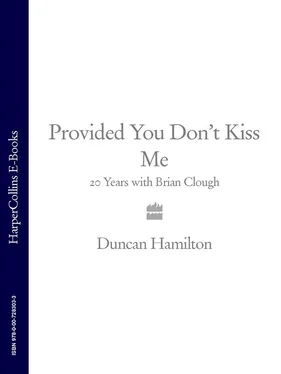In the 1970s, when hooliganism ran across it like a ghastly scar, football wasn’t just out of kilter with fashion. It was regarded as faintly repellent, like a sour smell, by most of those who never passed through the turnstiles. I knew a lot of people who genuinely believed that the scene before a typical Saturday afternoon game resembled Lowry’s melancholic painting Going to the Match : dark, whippet-thin fans in flat caps and mufflers, bent into a slicing wind, and the skyline around each ground smudged by smoke from factory chimneys. Football to them was crude, a prehistoric pastime, and redolent of a distant past featuring dubbin, cheap liniment and steel-toecapped boots. Even by the 1980s, when the implications of the tragedies at Heysel, Bradford and Hillsborough were absorbed and football began to look at itself afresh, it was still a struggle to weld together a convincing argument for its future health.
In each decade Clough significantly promoted football through the strength of his personality; as a character instantly recognisable to those who didn’t habitually watch the game. He was a guest on Parkinson . Mike Yarwood impersonated him with a jabbing finger and a ‘now young man, listen to me’ routine, which Clough found immensely flattering. ‘True fame is when the newspapers spell your name right in Karachi – and ordinary fame is when Yarwood does you,’ he once told me. ‘Yarwood did me a favour. He made me popular. He advanced my cause.’
Clough was so skilled at self-promotion that I felt he didn’t need anyone to beat a drum on his behalf. TV and newspapers adored him because you seldom had to look underneath his words to find the hidden meaning (though the motive was often of labyrinthine complexity). Each sentence was plain and pointed, like a spear. He didn’t rely on qualifying terms such as ‘perhaps’ or ‘might’ or ‘maybe’. He didn’t dissolve into banality. He hated yawning politeness, and didn’t mind being portrayed as a snarling malcontent.
A sport’s back-page lead, aimed primarily at a popular audience, is necessarily limited in scope. My own pieces tended for obvious reasons to be variations on a single theme: Clough’s opinions. He sold newspapers. I would sit at the keyboard and write: ‘Brian Clough today …’ and then press on with the guts of the story.
Every day on the back of the Nottingham Evening Post , Clough ‘demanded’ or ‘insisted’ or ‘attacked’ or ‘appealed’ or (less often) ‘made a plea’ or ‘sent a message’ to someone or other. The quotes justifying the first paragraph began to run from the third. The rest was as straightforward as joining the dots in a child’s puzzle book. The basic principle was to make sure his name appeared in the intro because, as Hollywood says, the lead always gets the close-up.
Good quotes are the diamonds of popular journalism, and Clough represented the richest and the deepest seam. He was an inexhaustible mine of one-liners. He took pride in being an agitator, and gratuitously provocative. He didn’t care – at least not very much – about the way he was perceived, whether or not anyone liked him or how his opinions would play politically, except, naturally, when it suited his own agenda. It meant that enemies gathered in battalions, a fact Clough acknowledged sanguinely.
‘That bunch of shithouses at the Football Association – who know nowt – want me to shut up,’ he said from behind his cluttered desk, showing me a letter with the FA’s embossed shield on it. The FA had written to admonish him for a comment he had made about wanting to ‘kick’ one of his own players. ‘Let’s you and me write a piece and tell them to fuck off – in the nicest possible way. You’ll pick the right words … Make it up for me.’ He trusted you to do your job the way he trusted a player on a Saturday afternoon. If you didn’t shape up … well, a bollocking followed.
Stories about his epic drinking, the rages like forked lightning, and the ‘bungs’ are draped like a black cape across the sad last acts of his career. But a man’s life has to be seen in the full to appreciate it. He shouldn’t be judged on the last flickerings of the candle. The good years were pure gravy for Clough, filled with silverware and respect, and not purely because his name was there in the record books as having won the League Championship and European Cup twice apiece. His legacy went beyond the business of winning trophies.
When Clough became a manager at Hartlepool in 1965, aged only thirty, his contemporaries were predominantly conventional figures with a 1940s or 1950s ideology. Most were middleaged or approaching it and maintained a staid, regulation collar-and-tie approach to football. Clough was iconoclastic. Very early on he recognised the value of publicity and how to make it work for him. He had the loudest voice, the magnetic pull of the fairground barker and an understanding of how the mechanics of the media functioned. He knew how to exploit it for himself.
As a player at Middlesbrough, Clough had deliberately leaked his dissatisfaction with the club’s attitude towards him so that he could gain the upper hand in the struggle to either force a transfer or improve his salary. He was eventually sold. As a manager, with Peter Taylor, he had the prescience to realise that two men, personally compatible but with contrasting talents, could do the manager’s job better than one. He pioneered the idea of a short break mid-season for the team, and proved himself innovative in his handling of players and in his approach to coaching.
Clough was also lucky. His break into management came at the time when television began to embrace football more firmly, chiefly because of England’s World Cup win in 1966. He eventually became emblematic of the period when managers began to dominate the headlines as much as, if not more than, players – and he was one of the main reasons why the cult of the manager developed in the way it did. Clough made sure that he – not the players, and certainly not the chairman who bankrolled it – was the axis on which the club always turned. Open dissent against someone or something, or merely going against the grain, pushed him to centre stage. The strategy of yelling his contempt and kicking up dust whenever he could for the sake of it proved profitable. Clough soon became more important than whichever team he managed, and then more important than the club itself. Profile was everything to him because it was accompanied by power.
As a manager, Clough enjoyed the advantage of relative youth, which helped him to glamorise management in the late 1960s and early 1970s and give it an almost film-star sheen. When he secured promotion to the First Division for Derby in 1969, he was thirty-four years old. His contemporaries were ancient by comparison. Joe Mercer (Manchester City) was fifty-five. Bill Shankly (Liverpool) was fifty-four, and Bertie Mee (Arsenal) and Joe Harvey (Newcastle) were both fifty-one. Bill Nicholson (Tottenham) and Harry Catterick (Everton) were fifty. Don Revie was forty-two, but looked ten years older; perhaps it was the pressure of managing Leeds. When Clough took Forest into the First Division eight years later, all but one of those managers (Revie) had retired.
Clough didn’t merely represent the start of a new generation, he shaped it too. In the early 1980s, after Forest’s two European Cup wins, the lower divisions seemed to me to be awash with Clough clones. I met one who came to the City Ground in the manner of a pilgrim worshipping at a shrine. He looked like a very bad insomniac, gaunt and hollow-eyed with a putty-coloured complexion. As I listened to him talk about discipline, as though a big stick was enough to guarantee quivering obedience, I realised how badly he wanted to be Clough, but what was also clear was his utter failure to appreciate the people skills of the man he venerated. He had, perhaps unknowingly, begun to imitate some of Clough’s gestures, and the inflections in his voice and a few of his expressions had infiltrated his vocabulary. I thought of the old line about one Shakespeare and many Hamlets.
Читать дальше












